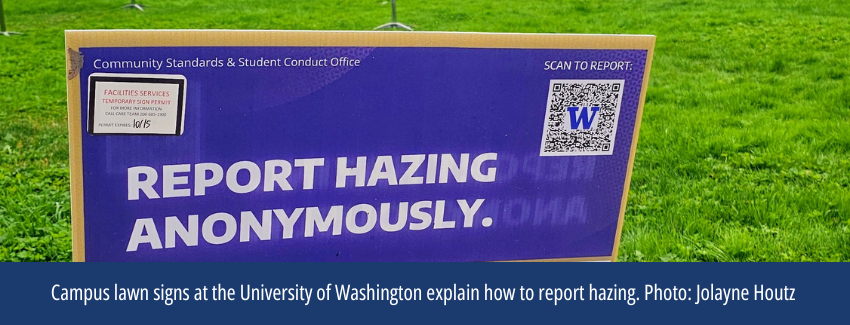How do we end hazing?
By bringing it out of the shadows
Welcome to HazingInfo.org – the nation’s first one-stop resource for comprehensive, objective information about hazing incidents at US colleges and universities.
Our free, searchable database features publicly available information on hazing incidents. By shining a light on hazing, we work to protect college students and help them make informed decisions about clubs, teams and organizations they may want to join.
Our goal is straightforward: to end hazing through access to data that exposes hazing incidents on college campuses across the US.
Use our “Campus Lookup” feature to learn about hazing at your college or university. What you find may surprise you.
Why do we need HazingInfo.org?
Another springtime surge in hazing incidents this year underscores the urgency of greater transparency about hazing. In just the past three months:
- The University of Virginia shut down Pi Kappa Alpha fraternity and suspended three others due to hazing allegations, including one incident that reportedly left a student comatose.
- The University of Maryland imposed a temporary ban on all Greek life recruitment activities and events with alcohol following a series of reported hazing incidents in Greek organizations on campus, including students being beaten, burned and forced to drink urine. Five fraternities are still under investigation: Kappa Alpha, Lambda Chi Alpha, Phi Sigma Kappa, Sigma Nu and Zeta Beta Tau.
- The University of Connecticut suspended Lambda Theta Phi Latin fraternity after its former chapter president was arrested twice on charges related to hazing.
- A lawsuit was filed against Sigma Chi fraternity at the College of Charleston accusing its members of hazing a student until he withdrew from school with post-traumatic stress disorder–and continuing even after he enrolled at a different university.
- Police received two reports of hazing at Alpha Tau Omega fraternity at Emory University in Georgia that included the forced consumption of alcohol.
- Sigma Phi Epsilon at University of North Carolina Greensboro was given a 10-year suspension from the university amid a hazing investigation into the fraternity's alleged recruitment violations.
- Washington State University began an investigation of Sigma Nu fraternity for an alleged hazing violation as well as alcohol and reckless endangerment violations.
Seven states. Ten fraternities. And one deeply entrenched problem: toxic hazing culture.
These are just the incidents we know about because they made headlines. Many other hazing incidents are quietly "handled" by campus administrators, national fraternity organizations, and others anxious to keep hazing incidents under wraps and out of the news.
How HazingInfo.org works
It’s a challenge for students and families to find timely information about hazing incidents on their campuses. That’s no accident.
Colleges, universities and national student organizations like fraternities and sororities make it challenging to unearth those reports–if they are available at all.
HazingInfo.org collects data from hazing incident reports at schools that are required to provide that information by law. Currently, nine states mandate public reporting about hazing incidents: Georgia, Louisiana, New Jersey, Ohio, Pennsylvania, South Carolina, Texas, Virginia, and Washington. Indiana will require reporting as of July 1.
We also gather data from credible media sources to capture the most up-to-date information, rather than waiting for months or years for those incidents to appear in official reports.
While hazing is often considered a fraternity and sorority problem, we know from the data that hazing takes place in many different types of student clubs, athletic teams, marching bands and other student organizations.
Our database currently contains hazing of all types at colleges and universities in the nine states where reporting is required.
Our team is continuing to add new data until all 50 states are represented on our website.
Meet the HazingInfo.org team
HazingInfo.org is a partnership between the University of Maine, the University of Washington Information School, and the national research organization StopHazing, along with founders Jolayne Houtz and Hector Martinez, who lost their son, Sam, to hazing in 2019.
Our data collection and website are powered by a team of UW Information School students harnessing their data science skills to raise awareness about hazing and hazing prevention.
Together, we are united by our vision: a world where no one is harmed or killed by hazing.
We invite you to explore HazingInfo.org! Share your ideas and thoughts with us at info@hazinginfo.org.

-1.jpg)


